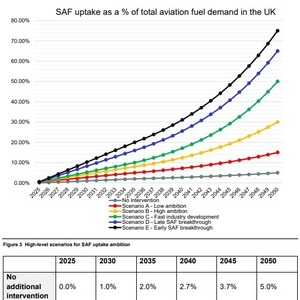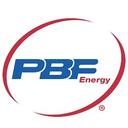UK seeks public comments on proposed SAF mandate

July 26, 2021
BY Erin Krueger
The U.K. Department for Transport on July 23 opened a public consultation on a proposal that would establish a sustainable aviation fuels (SAF) mandate requiring jet fuels suppliers to blend an increasing portion of SAF into aviation fuel starting in 2025.
A consultation document released by the U.K. government offers five scenarios for the proposed mandate. All would start with a proposed 0.5 percent SAF requirement in 2025, but would ramp up a vasty different rates, requiring between 15 percent and 75 percent SAF blends by 2050.
Advertisement
The Department for Transport is seeking public comments on the need for a SAF mandate; high-level ambition and design of the proposed SAF mandate; fuel eligibility criteria; interactions between SAF and other domestic and international policy; and compliance, reporting and verification principles that will steer the creation of the scheme.
Velocys issued a statement welcoming the SAF mandate consultation. “SAF mandates could play an important part in enabling aviation to decarbonize,” said Andrew Morris, chief financial officer of Velocys. “Velocys welcomes the government’s consultation in this area and its theme of setting ambitious but realistic targets for carbon reduction. But as the Transport Secretary himself states, this should also be the beginning of a conversation on providing price certainty for investment into this nascent sector.
“Combined with SAF mandates, a price support mechanism that ensures stable prices for SAF will go a long way to giving investors the confidence they need to invest in UK SAF production and supply to deliver the Jet Zero ambition,” he continued.
Advertisement
“Last month Velocys’ technology enabled the world’s first commercial flight fuelled with SAF derived from wood chips, demonstrating that ours is a ‘here and now’ technological solution to decarbonising aviation,” Morris added. “We look forward to responding to this consultation and the jet zero consultation, whilst proceeding with the development of our waste-to-SAF plant near Immingham.”
The consultation is open through Sept. 19. Additional information is available on the U.K. Department for Transport website.
Related Stories
Imperial Oil Ltd. on Aug. 1 confirmed it has completed construction and commissioning of its renewable diesel project at the Strathcona refinery near Edmonton, Alberta. The facility began producing renewable diesel in July.
PBF Energy Inc. on July 31 announced the St. Bernard Renewables facility averaged approximately 14,200 barrels per day of renewable diesel production during the second quarter of 2025. Production is expected to expand in Q3.
Sen. Chuck Grassley, R-Iowa, on July 31 pressed Derek Theurer, President Donald Trump’s nominee to serve as under secretary of the U.S. Department of Treasury, on the expected timeline for the release of 45Z guidance.
LG Chem and Enilive have taken a major step toward biofuels growth by breaking ground on Korea’s first hydrotreated vegetable oil (HVO) and sustainable aviation fuel (SAF) production plant in LG Chem’s Daesan Chemical Complex.
Avfuel Corp., the leading independent supplier of aviation fuel and services, is expanding its sustainable aviation fuel (SAF) footprint with the addition of a new, strategic supply point in Denver, Colorado—the first of its kind in the region.
Upcoming Events










